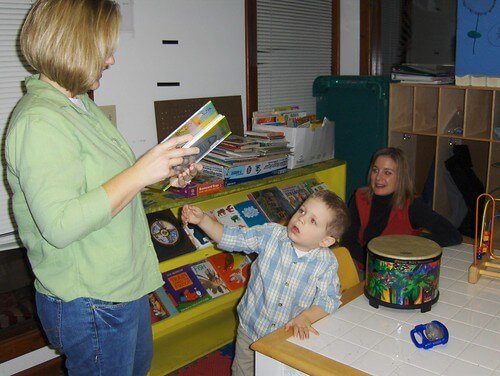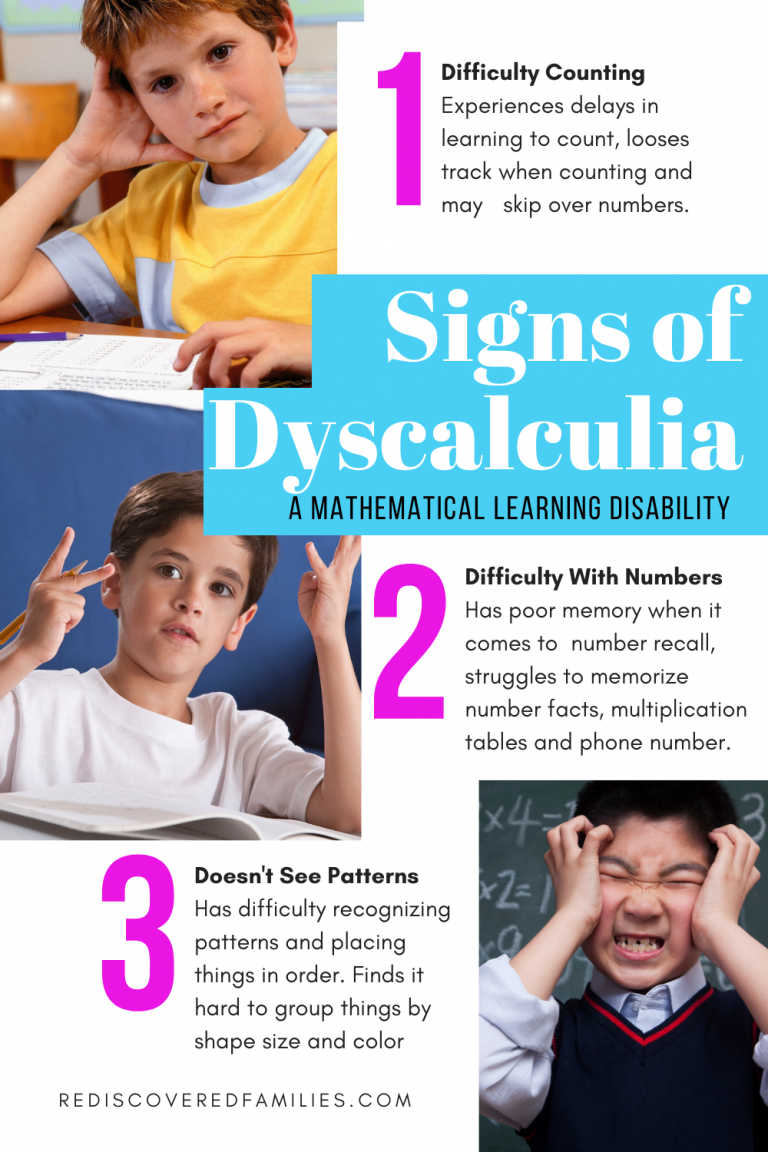How Is A Learning Disorder Diagnosed In A Child
Parents or teachers may first spot the signs of a learning disorder in a child. The child may often have trouble with:
-
Reading, spelling, writing, or doing math problems
-
Understanding or following directions
-
Telling right from left
-
Reversing letters or numbers. Examples are confusing b and d, or 12 and 21.
Before a mental health referral is made, your child’s healthcare provider will want to rule out any other health problems. Once this is done, a mental health provider, such as a school psychologist, can appropriately diagnose a learning disorder. The provider will talk with parents and teachers. The child will also need educational and mental health testing.
Public schools have a duty to evaluate children with certain learning problems. When appropriate, these schools must also offer treatment. Check with your school to find out how to request an evaluation. An evaluation identifies if your child has a learning disorder. It also finds learning strengths and weaknesses. The results help decide on your childs educational needs and best placement at school.
A learning disability may greatly interfere with your childs ability to succeed in school. If so, then they may be eligible for certain protections and reasonable accommodations under the Americans with Disabilities Act or Section 504 of the Civil Rights Act. Talk with your childs teacher or principal about how to get more information.
What Is A Learning Disability
A learning disability is a kind of learning problem. It happens when a person with average or above-average abilities for thinking and reasoning has trouble learning certain skills.
- Is a specific difficulty in one area ;
- Can range from mild to severe;
- Is not the same as an intellectual disability . An intellectual disability causes learning problems in many areas.
Do Parents Have Rights If The School District Refuses To Do An Evaluation Or After Evaluation Concludes The Child Is Not Eligible For Special Education Services
If the school district refuses to do an evaluation or, after evaluating the child, concludes the child is not eligible for special education services under IDEA, parents have other rights. If they are refused an evaluation or disagree with the evaluation, parents may be entitled to an independent evaluation at the school districts expense. Parents also have the option to pay for an evaluation by a professional of their choice.
As part of the dispute resolution process parents have the right to request mediation, filing of a state complaint, or filing for a due process hearing. When using these processes, a parents case may be stronger when informal methods of conflict resolution have been attempted.
IDEA requires school systems to have procedures in place to assist parents in resolving disputes through mediation, a voluntary process. Mediation allows parents and school districts to explain their positions to an impartial mediator who facilitates the discussion and assists the parties in agreeing upon legally binding solutions to the conflict. The costs of mediation are paid for by the state education agency .
The state complaint process requires a parent to file a letter with the state education agency outlining the violation of Part B of IDEA or its implementing regulations. A copy of the complaint must be furnished to the school district at the time the complaint is file d with the SEA if the violation occurred in the school district.
Read Also: Can You Collect Disability And Still Work
Parenting A Child With A Learning Disability
Finding out your child has a learning disability can be overwhelming. Many parents find the process of diagnosing a learning disability incredibly frustrating, and then once the diagnosis comes, they face an uphill battle to get their child the help they need.
The best thing you can do as a parent is simply to love and support your child. These tips can also help you help your child:
1. Learn everything you can. Get all the facts about your child’s learning disability and how it affects the learning process. Research services and supportive strategies so that you’ll be able to take an active role in deciding on the right treatment for your child.
2. Be your child’s advocate. Work with your child’s school to develop an IEP — a special plan that sets goals for your child and describes support that may be needed to reach those goals. Understand special education laws and school policies so you can make sure your child is getting the most out of school. Many services may be available, but they may not be offered until you ask for them.
3. Make sure your child has healthy habits. A child who gets plenty of sleep at night, eats a balanced diet, and gets plenty of exercise is a healthier child, both mentally and physically.
4. Pay attention to your child’s mood. Learning disabilities can be bad for a child’s self-esteem. Keep an eye out for symptoms of depression, such as moodiness, changes in sleep or appetite, or loss of interest in their usual activities.
Signs And Symptoms Of Learning Disabilities And Disorders

If youre worried, dont wait
If you suspect that your childs learning difficulties may require special assistance, please do not delay in finding support. The sooner you move forward, the better your childs chances for reaching their full potential.
Learning disabilities look very different from one child to another. One child may struggle with reading and spelling, while another loves books but cant understand math. Still another child may have difficulty understanding what others are saying or communicating out loud. The problems are very different, but they are all learning disorders.
Its not always easy to identify learning disabilities. Because of the wide variations, there is no single symptom or profile that you can look to as proof of a problem. However, some warning signs are more common than others at different ages. If youre aware of what they are, youll be able to catch a learning disorder early and quickly take steps to get your child help.
The following checklists offer some common red flags for learning disorders. Remember that children who dont have learning disabilities may still experience some of these difficulties at various times. The time for concern is when there is a consistent unevenness in your childs ability to master certain skills.
Don’t Miss: How Much Is 60 Va Disability
Types Of Learning Disability Tests
Some tests target the disability your child is suspected of having in order to verify or refute the disorder. Other tests look at your childs global functioning to create a general profile. This adds to everyones understanding of your child and whether theres a learning disability present. Many tests measure how your childs ability compares to achievement. Some types of tests:
- Educational achievement
- Intellectual, or cognitive, testing test)
- Questionnaires
- Neuropsychological
Learning Disabilities In Motor Skills
Motor difficulty refers to problems with movement and coordination whether it is with fine motor skills or gross motor skills . A motor disability is sometimes referred to as an output activity meaning that it relates to the output of information from the brain. In order to run, jump, write or cut something, the brain must be able to communicate with the necessary limbs to complete the action.
Signs that your child might have a motor coordination disability include problems with physical abilities that require hand-eye coordination, like holding a pencil or buttoning a shirt.
You May Like: How To Get A New Disability Card
Who Can Do An Evaluation
The people who do the evaluations can vary. They might be a learning specialist, an educational therapist, or a speech and language therapist. But often a psychologist is involved, because psychologists are also trained to measure intellectual capacity and think carefully about emotional difficulties that might also interfere with classroom adjustment.
Many children who have learning issues also have other conditions like anxiety, they can feel demoralized, or even be experiencing childhood depression, which leads them to have trouble managing academic demands. A neuropsychologist may also be involved in an evaluation, which is typically helpful in elucidating how aspects of cognitive functioning, like attention or executive functioning, are affecting classroom learning.
Learning Difficulties And Early Signs Of Learning Disorders
Learning difficulties and early signs of learning disorders are often picked up in the first two years of school, when children start classroom-based learning in reading, writing and maths.
If your school-age child has learning difficulties or a learning disorder, you might notice that they:
- dislike reading, writing or maths and/or find reading, writing or maths hard
- have a lot of trouble spelling common words, using rhyming words or counting
- find it hard to spot the sounds and syllables in words for example, the k sound in monkey
- find it hard to link a number to the associated word for example, 5 and five
- dont feel confident about schoolwork.
If your child has early learning difficulties, it doesnt automatically mean they have a learning disorder. Some children take longer than others to develop literacy and numeracy skills. Or there might be other things that make it hard for children for example, theyve missed a lot of school or they have hearing or vision problems.
Also Check: Can You Get Social Security And Disability
What Skills Are You Testing For
There are many kinds of learning, but the kinds we look at to diagnose a learning disability tend to be reading capacity, writing capacity and mathematics. Im looking for differences in their ability to perform on either of the mechanical tests or applied tests compared to their intellectual capacity.
The vast majority of students I see when were evaluating for learning disabilities struggle with reading. For reading, the mechanical skills are being able to recognize words by sight, being able to sound out words that are unfamiliar to you, being able to read words in sentences and then being able to derive meaning from what youve read. Thats the process of developing from decoding to fluency and eventually comprehension, really understanding them.
With mathematics, I want to look at their basic math fact knowledge and how quickly they can apply math facts. I want to see what computation skills they have, like solving paper and pencil math tests. Then I want to see how they answer functional word problems.
Do All States And School Districts Have The Same Policies For Implementing Rti And Conducting Special Education Evaluations
Every State has established its own policies, and many school districts within each State may also have different procedures. Many States and local school districts require a pre-referral process. While some schools and some States have required the use of RTI for students with possible learning disabilities, others are requiring RTI for students suspected of having any disability.
Also Check: Can You Attend College While On Disability
Parent Training And Information Centers
Every state has at least one PTI that provides support and information to families. Staff at the PTI may be able to suggest where to get a low-cost private evaluation. Some states also have Community Parent Resource Centers, which have more resources for low-income families. Learn how to find a PTI near you.
How Is A Learning Disability Treated

A learning disability is treated by using educational tools to help overcome it. Medicines and counselling usually aren’t used.
For most children, an Individual Education Plan will be created. An IEP may also be called an Individualized Program Plan . An IEP details your child’s disability, appropriate teaching methods, and goals for the school year. The IEP changes based on how well your child is doing. You have the right to ask for a change in the IEP if you don’t agree with it.
Also Check: Is Fibromyalgia A Long Term Disability
Hope For Learning Disabilities: The Brain Can Change
Science has made great strides in understanding the inner workings of the brain, and one important discovery that brings new hope for learning disabilities and disorders is called neuroplasticity. Neuroplasticity refers to the brains natural, lifelong ability to change.
Throughout life, the brain is able to form new connections and generate new brain cells in response to experience and learning. This knowledge has led to groundbreaking new treatments for learning disabilities that take advantage of the brains ability to change. Innovative programs, such as the Arrowsmith program, use strategic brain exercises to identify and strengthen weak cognitive areas. For example, for children who have difficulty distinguishing between different sounds in a word, there are new computer-based learning programs that slow down the sounds so that children can understand them and gradually increase their speed of comprehension.
These discoveries about neuroplasticity provide hope to all students with learning disorders, and further research may lead to additional new treatments that target the actual causes of learning disabilities, rather than simply offering coping strategies to compensate for weaknesses.
How does understanding the brain help a learning disorder?
Signs And Symptoms Of Learning Disabilities: Preschool Age
- Problems pronouncing words.
- Trouble finding the right word.
- Difficulty rhyming.
- Trouble learning the alphabet, numbers, colors, shapes, or days of the week.
- Difficulty following directions or learning routines.
- Difficulty controlling crayons, pencils, and scissors, or coloring within the lines.
- Trouble with buttons, zippers, snaps, or learning to tie shoes.
You May Like: What Happens To Social Security Disability When You Turn 65
Conditions That Often Occur Along With Learning Disabilities
Children and youth with learning disabilities may also have problems with:
- Attention. Many children with learning disabilities also have Attention Deficit Hyperactivity Disorder , making it difficult for them to focus and pay attention.
- Mood, anxiety and behaviour. Learning disabilities can make school and learning more challenging. They may also affect social relationships. These stresses can affect moods, and cause anxiety and behaviour problems. Its a 2 way street, though. Problems with mood, anxiety and behaviour also affect learning.
- Listening and speaking .
- Coordinating large or small muscle movements. This can mean difficulties walking, running, throwing a ball or playing sports. It can also mean trouble with hand writing, drawing or other hand movements.
Learning Disabilities In Writing
Learning disabilities in writing can involve the physical act of writing or the mental activity of comprehending information. Basic writing disorder refers to physical difficulty forming words and letters. Expressive writing disability indicates a struggle to organize thoughts on paper.
Symptoms of a written language learning disability revolve around the act of writing. They include problems with:
- Neatness and consistency of writing.
- Accurately copying letters and words.
- Spelling consistency.
- Writing organization and coherence.
Read Also: How To Get Disability For Bipolar Disorder
What Should A Comprehensive Evaluation Include
Information from an RTI process alone does not and cannot identify a child as having a learning disability. A comprehensive evaluation for a child who is suspected of having a specific learning disability may include data collected by the teacher during RTI progress monitoring process; but most importantly, a comprehensive evaluation should include information from educational and psychological assessments showing patterns of strengths and weaknesses and include input from parents, teachers and school psychologists.
When asked if a State could mandate RTI be used as the sole criterion to determine if a child had specific learning disabilities, the US Department of Education responded that SLD evaluation must include a variety of assessment tools and may not use any single measure of assessment as the sole criterion for determining whether a child is a child with a disability, as required under 34 CFR §300.304.
The position of the Learning Disabilities Association of America is that RTI should never be used to delay an evaluation for special education, deny evaluations, or place students in special education without the benefit of a comprehensive evaluation. RTI should never be used as the only assessment to determine identification and eligibility for services. RTI can never take the place of a comprehensive multi-disciplinary evaluation that delves into the specific areas of concern interfering with the childs learning.
Tests Used To Evaluate Learning
Diagnosing a learning disability in public schools requires several types of tests. Common tests used to diagnose a learning disability include tests of intelligence, achievement, visual-motor integration, and language. Other tests may also be used depending on the evaluator’s preferences and the child’s needs.
The Individuals With Disabilities Education Act requires that a diagnosis of a learning disability is not made on the basis of a single test.
Read Also: What Is Considered A Disability In California
The Procedure For Learning Disabilities Diagnosis
If you are concerned that your child has a learning disability, you have the legal right to request testing. Alternately, your childs teacher can also start the process if theyre suspicious that your child has a learning disorder. The teacher, school counselor, or principal will contact you to discuss their concerns and get your permission to proceed with the learning disabilities evaluation.
Once an evaluation request has been made, the next step is to begin the testing. If the school disagrees that your child should be tested, you can still proceed. You can find learning disabilities testing services by asking the school for recommendations, checking with your childs doctor for sources, contacting your insurance company to find out what testers they approve of, or asking friends and family members who have experienced this with their child.
What Every Parent Should Know

Children with specific learning disabilities are eligible for special education services or accommodations at school under the Individuals with Disabilities in Education Act external icon and an anti-discrimination law known as Section 504.external icon The U.S. Department of Education issued a Dear Colleague letterpdf iconexternal icon providing clarification to both parents and practitioners about ensuring a high-quality education for children with specific learning disabilities, including children with dyslexia, dyscalculia, and dysgraphia.
Recommended Reading: How To Get Short Term Disability Approved While Pregnant
